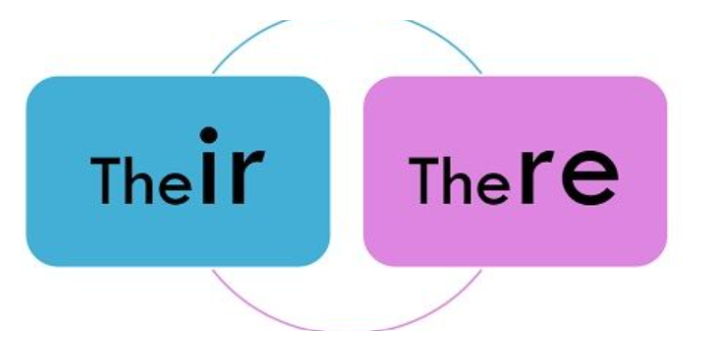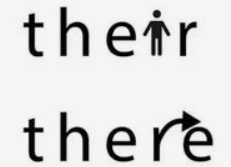There vs Their: Demystifying the Confusing Homophone Pair
Contents

The "There" vs "Their" Conundrum
"Once upon a time, their lived a lion. The lion was…"
Wait, did you notice anything wrong? If you did, good job! But if you did not, this article is exactly what you should read, because the correct usage here should be "Once upon a time, there lived a lion"!
If you often find these words confusing, don't worry, you are not alone. "Their" vs "there" is a common conundrum that many English learners face. The meaning of "there" and "their" can be quite tricky to master, but fear not, we're here to demystify this confusing homophone pair.
To begin with, let's understand the basic difference between these two words. "There" is an adverb used to indicate a place or position. On the other hand, "their" is a possessive pronoun used to show ownership. That is not all, there are many more nuances to be aware of when using "there" and "their."
The aim of this article is to help you with these nuances and provide you with a clear understanding of the difference between "there" and "their." By the end, you'll be able to confidently use these words in your everyday English conversations.
Let's start with exploring some usage examples for "there" and "their."
Usage Examples for "There" and "Their"
Here is a table with detailed explanations of the use of "there" and "their." You can find the specific functions of "their" and "there" in different scenarios and the corresponding examples to help clarify the difference between these two words:
Word | Usage | Examples | Explanation |
There | To indicate location | "The park is over there." "Her house is here, not there." | "There" is used as an adverb to indicate a specific location. |
In existence sentences | "There is a cat on the roof." "Look! There are flowers in the garden." | "There" is used to introduce the existence of something. | |
In introductory sentences | "There are two apples on the table." "There is a book on the shelf." | "There" is used to introduce a noun phrase and indicate its existence. | |
Their | To show possession while using plural nouns | "They took their dogs for a walk." "The students returned to their classrooms." | "Their" indicates that multiple people possess multiple dogs. |
With singular indefinite pronouns | “Everyone has their own opinion.” “Somebody left their bag in the hallway.” | "Their” is used as a gender-neutral pronoun to show possession with singular indefinite pronouns. | |
With uncountable nouns in an implied sense | "The team celebrated their victory." “The audience felt their excitement during the performance.” | "Their” refers to the entire team celebrating its victory. |
It's important to grasp these usage examples properly because they demonstrate when and how each word should be used correctly. Practice incorporating these examples into your spoken English sentences for better fluency and accuracy.
Pronouncing "There" and "Their" Properly
Pronouncing words correctly is crucial for effective communication in English. When it comes to the homophones "there" and "their," it's important to note that they are pronounced exactly the same. Despite their different spellings and meanings, both words are generally pronounced as /ðɛər/. Let's take a closer look at this pronunciation and explore slight regional variations.
In both American, British, and Indian English, "there" and "their" are pronounced with the same sounds but with slight variations. Here is a table showcasing the variation in pronunciation of "there" and "their" across three regions:
Region | Phonetic Transcription | Transcription with Alphabets |
US | /ðɛər/ | thehr |
UK | /ðɛər/ | theuh |
India | /ðɛər/ | dheuh |
As you can see, the only difference in the pronunciation of "there" and "their" in different regions is that the /r/ sound at the end of both words is generally not prominently pronounced in UK and Indian English. The initial sound in the Indian English pronunciation also has a very slight variation.
Remember, regardless of where you are from or which English accent you use, focusing on clear articulation of each word will ensure effective communication.
You can check these YouTube videos posted by the Cambridge Dictionary to listen to these slight regional variations in the pronunciations of "there" and "their."

How Do You Remember the Difference Between "There" and "Their"?
Now that we have covered the basics of the meaning of "there" and "their" here are some fun tips and tricks to help you remember when to use each one correctly.
Mnemonic Devices: One effective way to remember the difference between "there" and "their" is by creating mnemonic devices. One such device is associating 'there' with 'here'. Since both words end in "-ere," it can help remind you that "there" refers to a place or location away from the speaker, while "their" indicates possession.
Visualize the Context: Another technique is visualizing the context in which each word is used. Picture yourself pointing towards a distant object or location while saying "there." This mental association will reinforce the meaning of the word as indicating a place. On the other hand, think of a group of people holding something together while saying "their." This visualization will help you remember that "their" implies possession by multiple individuals.
Create Personal Examples: To make your learning experience more engaging, come up with personal examples for each word. For example, think about your friends going on a trip together and say, "They left their bags over there." By relating these words to your own experiences, you'll find it easier to recall their meanings in different contexts.
You can also try to distinguish between "there" and "their" in day-to-day situations where you are exposed to the English language, like while watching movies. Remembering when to use "there" or "their" can be challenging at first, but with these fun tips, you'll soon become an expert!
"There" vs "Their" in Indian Languages
Indian languages have their own unique ways of expressing the meanings of "there" and "their". It's interesting to see how different languages handle these concepts. Let's explore the translations of "there" and "their" in a few Indian languages.
Language | There | Their |
Hindi | वहाँ (vahāṃ) | उनका (unka) |
Bengali | সেখানে (shekhane) | তাদের (tader) |
Telugu | అక్కడ (akkada) | వారి (vaari) |
Malayalam | അതിൻറെ (athinte) | അവരുടെ (avaruṭe) |
Punjabi | ਉੱਥੇ (utthe) | ਉਨਾਂ ਦੇ (una de) |
Remembering the translations of “there” and “their” in your native language can help reinforce their meanings in English. This way, you can easily navigate between your native language and English, making it easier to grasp their nuances.
Some Common Mistakes & How to Avoid Them
In this section, we will highlight some common mistakes and provide tips on how to avoid them.
1. Incorrect usage with singular nouns: Another error is using "their" with singular nouns instead of using the correct possessive pronoun "his" or "her." For example, saying "Everyone has their own opinion" should be corrected to "Everyone has his or her own opinion."
2. Pluralizing uncountable nouns: Incorrectly using "their" with uncountable nouns can also be a mistake. For instance, saying "The team celebrated their victory" should be changed to "The team celebrated its victory."
3. Lack of subject-verb agreement: Sometimes learners make errors by not matching the subject and verb correctly in sentences that use "there." For example, saying "There's two apples on the table" instead of saying "There are two apples on the table."
To avoid these mistakes:
Understand the meanings of both words clearly.
Review subject-verb agreement rules.
Practice using possessive pronouns correctly with singular and plural nouns.
Double-check your sentence construction before speaking or writing.
By being aware of these common mistakes and practising the correct usage, you can avoid confusion and improve your English language skills. You can also seek guidance from spoken English course books for more clarity. Remember, the key is to pay attention to the context and meaning of the sentence.
Key Takeaways
Now that we have explored the nuances in the meanings of "there" and "their", let's summarize the key points covered in this article. We have seen that "there" is used as an adverb to indicate location or existence, while "their" is a possessive pronoun used to show ownership by multiple people. Pronunciation-wise, both "there" and "their" are homophones, meaning they are pronounced the same way regardless of region or accent. To remember when to use "there" or "their", you can employ memory aids like associating 'there' with 'here', visualizing scenarios where each word is used correctly, or creating mental associations that help you recall their meanings.
Understanding the difference between "there" and "their" is crucial for effective day-to-day communication in English. Remember to practice using them correctly in spoken English to reinforce your knowledge. If you'd like further improvement in your language skills, visit Clapingo's online English learning platform for resources tailored to Indian learners. You can find Clapingo's website here.
Happy learning!
FAQs
1. When should you use there?
The word "there" is used to indicate a place or location. For example, you can say, "The park is over there," when giving directions to a friend's place. Remember, "there" is an adverb.
2. Which is correct, there or their?
The choice between "there" and "their" depends on the context of the sentence. If you are referring to a place or location, use "there." On the other hand, if you are talking about possession by multiple people or things, use "their." For example, "They took their dogs for a walk."
3. Can I use their for singular?
Generally, we use "their" to show possession for plural nouns. However, it's worth noting that sometimes we use it with singular indefinite pronouns like everyone or somebody to avoid implying gender bias. For example, we say, “Everyone has their own opinion.”
Comments
Your comment has been submitted